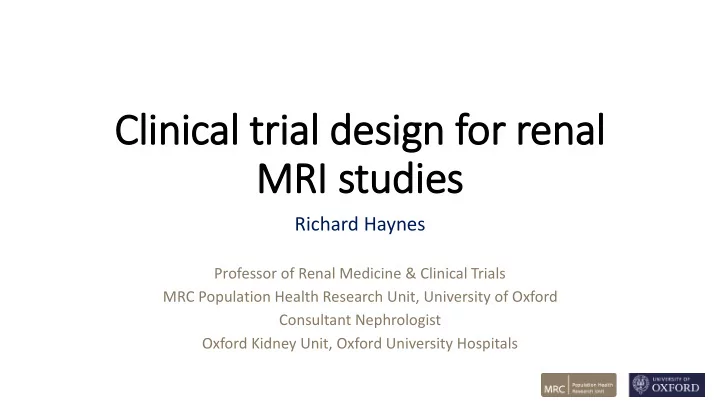

Clinical trial design for renal MRI I studies Richard Haynes Professor of Renal Medicine & Clinical Trials MRC Population Health Research Unit, University of Oxford Consultant Nephrologist Oxford Kidney Unit, Oxford University Hospitals
Role of renal MRI • As an endpoint in its own right • As an “enrichment” strategy • As a surrogate marker for clinical outcomes
Cli linic ical tria ials ls wit ith MRI endpoints Treatment R Control • Likely to be exploratory academic trials of established drugs or mid-phase in new drug development • Need efficient design and analysis
Cli linic ical tria ials ls wit ith MRI endpoints • Is the trial addressing a long-term (irreversible) or short-term (reversible) effect of the drug? • Long-term effects may be best assessed by including a baseline scan Treatment R Control
Cli linic ical tria ials ls wit ith MRI endpoints • If trial can only be small or only a sub-sample of a larger randomized population, baseline scan allows ANCOVA analysis • Most statistically efficient • Accounts for any random differences at baseline • However, does increase number of scans: similar statistical power from same number of scans in double number of participants
Cli linic ical tria ials ls wit ith MRI endpoints • Short-term reversible effects most efficiently tested with cross-over design • Each participant acts as their own control WASHOUT PERIOD Treatment Control R Control Treatment
MRI as an enrichment strategy • Randomized trials attempt to recruit populations at risk of events of interest • Trial populations may select on basis of a biomarker which is associated with (does not necessarily cause) a higher risk of the event of interest • e.g. albuminuria in trials of CKD progression Treatment High risk R Control Low risk
MRI as an enrichment strategy • Total kidney volume approved by FDA for use as an enrichment biomarker in trials of ADPKD Model with age and eGFR Model with age, eGFR alone and TKV† Predicted event rate over 9.1% 11.0% 3 years Number needed to 11 9 recruit* Number needed to 13 25 screen* * For one event in 3 year follow-up † Age 20 -50, eGFR >50 mL/min/1.73m 2 , TKV >1 litre
MRI as a surrogate marker • Significant interest in identifying valid surrogate markers of end-stage kidney disease because of rarity of event and/or long follow-up times required • FDA/EMA have recently approved 40% decline in eGFR • More controversy around changes in albuminuria
MRI as a surrogate marker • Surrogate marker has a specific definition and to be a “true” surrogate a biomarker should fulfil the Prentice criteria 1. The treatment has an effect on the clinical outcome (e.g. ESRD) 2. The treatment has an effect on the surrogate 3. The surrogate is associated with the clinical outcome 4. The treatment effect on the clinical outcome is captured by the surrogate (or, adjusting the treatment effect on the clinical outcome for the surrogate substantially attenuates the treatment effect)
1. Risk of outcome MRI as a surrogate marker Treatment Control MRI measure 2. Treatment Control 3. Risk of outcome MRI measure 4. Effect on outcome Effect on MRI measure UNadjusted Adjusted
MRI as a surrogate marker • Surrogate markers are disease- and treatment-specific • Require appropriately-sized epidemiological studies to confirm association between surrogate and clinical outcome • Require clinical outcome trials to prove the effect of treatment on the clinical outcome • Require measurement of the surrogate within these trials
Cli linic ical tria ials ls and renal MRI • Trials are possible and with careful design and analysis can be done cost-effectively • Renal MRI may have a role in patient selection, but may not always be efficient • Renal MRI could be a surrogate marker and used in early phase drug trials, but more work needed
Recommend
More recommend